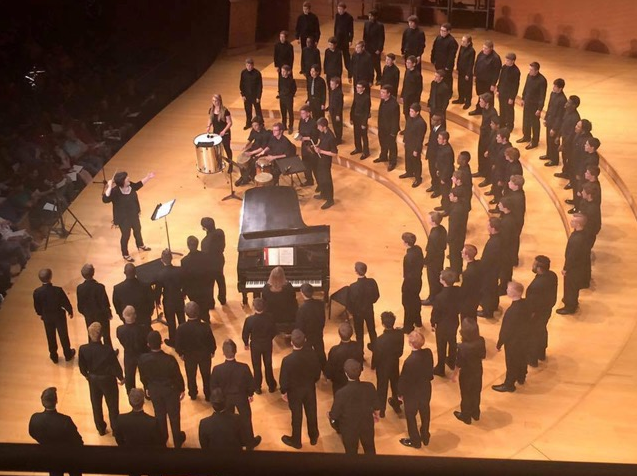
“It blew my mind”.
That’s how Dr. Andrea Ramsey, Assistant Professor of Conducting at University of Colorado at Boulder, tells Great Lakes Now she reacted to the water crisis in Flint when it was first revealed in 2015.
Dr. Ramsey got her PHD in Music Education at Michigan State University in Lansing. She had many friends in Michigan, and was watching Flint’s lead contamination problem closely.
She says when she first found out about Flint’s water crisis, “I thought: this is crazy! And nothing was being done to fix the problem. It was hard to process. It would be different if citizens had done this to themselves or done it on their own. But it was put upon them by something out of their control.”
At the same time as the Flint water crisis was peaking, Dr. Ramsey had a commission from the group called “Chorus America” to write a composition to be performed by children’s choirs across the country.
“This was me dealing with this,” she says, “and watching this. Somewhere in my brain, I knew I had this commission for Chorus America. So, one day I thought: why not put this together? I could do something about this water crisis and give some awareness to it and get it performed all over the place.”
Dr. Ramsey started googling to find essays and poems written about the Flint water crisis. But instead, a poem called “Flint” written by a 19th century British writer named Christina Georgina Rossetti, kept cropping up:
“An emerald is as green as grass;
A ruby red as blood;
A sapphire shines as blue as heaven;
A flint lies in the mud.
A diamond is a brilliant stone,
To catch the world’s desire;
An opal holds a fiery spark;
But a flint holds fire.”
Dr. Ramsey says she couldn’t get the line, “But a flint holds fire” out of her mind.
But before she started writing and composing, she realized she wanted the voices of children in Flint to be part of the piece.
She says one of her main objectives was to create a piece of art for students to sing that would be about the Flint water crisis, but would not be heavy and off-putting, or too political.
But she needed to have some sort of context.
She says, “I got the idea of getting quotes from Flint residents. I mentioned this on Facebook, and a friend of mine who is also a Michigan State Graduate and a professor of Music Education, Karen Salvador, said, “What can I do to help?”
The two women crafted some questions, including these: “How did the water crisis affect you and your family? What do you think people know about Flint?
They sent the questions to high school and junior high students at four different Flint schools.
Dr. Ramsey says the results were astounding: a wide array of emotions and responses, from sad to scared to angry to hopeful.
A few examples:
“We are often overlooked but we are really powerful.”
One student wrote, “I think you should tell the facts. I don’t think you should sugarcoat it. There’s no cure for lead poisoning.”
A poignant and simple statement from a student that stuck with Dr. Ramsey and is used in spoken word form in the final choral piece: “We can’t use the water anymore.”
Some of the comments brought Dr. Ramsey to tears, like one from a student telling about her mother getting the results from Health Department tests showing all four of her children – including her tiny baby – had lead poisoning.
Yet another student’s comment: “Corrupt government thinks very little of their residents.”
And another student said, “We are paying for water we can’t use.”
Dr. Ramsey spent last summer writing and composing, keeping in mind the comments she had gathered from the students. She said she wanted to “make it poetic and artistic…. but I still needed to include the facts. “.
At the end of the summer, Dr. Ramsey’s choral piece called “But a Flint Holds Fire” was born. It is a combination of lyrics as well as spoken word performances.
Some of the first performances of the piece were in Michigan.
Kyle Zeuch, director of children and youth choirs at the Michigan State University Community Music School, has known Dr. Ramsey since they were graduate students at MSU. He has now conducted the piece twice.
At a recent performance Zeuch conducted at the Michigan Music Conference in Grand Rapids, an entire program with songs of hope were built around “But A Flint Holds Fire”.
Zeuch says, “It was amazing. We sang folk songs, world music songs, and then we sang the Flint song to give the people of Flint a voice….and share that message with the people at our concert.”
He says the piece, “Starts somber but ends hopeful. There were tears in the audience but the symbol of hope at the end is what most people are moved by. That’s Andrea’s genius, the way she wrote this piece.”
Zeuch says the act of rehearsing with students in fifth through eighth grade was also an eye- opening experience. He says, “We spent a lot of time not only practicing the music, but talking about what was going on in Flint.” He says the comments from students in Flint who were experiencing the water crisis helped his kids get a better understanding of other children’s lives. Zeuch says, “One of the things they learned from this was empathy. That’s a hard thing to teach. ”
Before “But A Flint Holds Fire” was performed for the first time, Dr. Ramsey decided to include a QR code in the score that links to the website for Flint Rising. That’s a coalition working to help Flint families. She suggested that choirs copy and paste the code into their concert programs so that audience members could donate easily. Flint Rising is reporting an uptick in donations lately, and Dr. Ramsey says she hopes the song and its performances have helped.
Dr. Ramsey says, “I’ve been so pleased with the response so far. People have said ‘you really hit this one on the head with it being gripping and moving but not too glum.’ I wanted to tell the story honestly, and make sure I struck a balance ”
The piece is being performed by children’s choirs all across the country. However, Dr. Ramsey says she never thought the crisis would still be taking place, two years later. The people of Flint still cannot drink unfiltered water from their taps.
And now, Dr. Ramsey is coming back to where it all started.
She will be an artist-in-residence at the University of Michigan campus in Flint in October.




